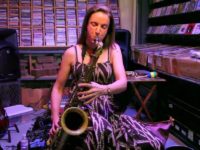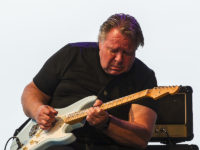With relatively few young guitarists among ECM Records’ current stable of artists poised to take the torch from John Abercrombie, Ralph Towner and Terje Rypdal, Jacob Young is more than ready to carry on the proud legacy.
His third ECM long-player with a twist on this Norwegian-American’s last name, Forever Young suggests a guitar player with a great amount of preparation and maturity behind him in all the important areas of musicianship, leadership and composing acumen.
Having learned the finer points of jazz guitar from Abercrombie and Jim Hall, and composition from Richie Beierach and Kenny Werner, Young returned to Oslo, and made an impact performing in the bands of saxophonist Tryge Seim, Mathias Eick and Manu Katché, and getting together Roy Powell and Jarle Vespestad for the frontier-bound rock-jazz trio Interstatic.
For Forever Young (June 17, 2014), Young surrounded himself with people with whom he’s got a great deal of familiarity: the saxophonist Seim, as well as other Katché bandmates Marcin Wasilewski (piano) and Slawomir Kurkiewicz (bass). With the drums handled by Michal Miskiewicz, Young’s back band is actually Seim and the Marcin Wasilewski trio, all-star performers of ECM’s “next” generation. Though they are decades removed from the label’s classic period, this record is what most people consider that “classic” ECM Sound: wandering Nordic folk melodies, notes that resonate without fanfare, and space used effectively as an instrument. Under Manfred Eicher’s attentive ears, the studio is used as an instrument.
The Garbarek comparison comes not from Seim’s sax simply sounding similar to the Norwegian legend, but in how he carries each of Young’s songs, as Young is often content to play a supportive role and let the symmetry take over.
Young spins strains that are lyrical and melodic, such as the Brazilian harmonics used for “I Lost My Heart To You,” during which he weaves his acoustic guitar around Wasilewski’s piano, and only well into the song does he breaks from the piano. Meanwhile, Seim’s tenor sax plays a simple but key role in amplifying the melody. “Therese’s Gate,” which is a little darker but no less elegant, is Young again on acoustic guitar but this time it’s Wasilewski who turns in a pretty, understated solo. Wasilewski’s piano is also standout on “Comeback Girl,” which is a graceful ballad paced by a soft, full jazz electric guitar tone. A winding melody that always lands on its feet, it typifies Wasilewski’s own songs, and he appropriately takes a solo.
When Young plugs in, the gentle vibe he established so carefully with his acoustic guitar stay right on track. The electric axe makes its initial appearance on “Bounce,” providing a mild undercurrent of American folk-rock to the proceedings. Seim takes the lead role, his tenor singing out like a vocal. Young takes a solo break, taking care to control the intonation of those notes, not merely selecting them. “1970,” the year Young was born, brandishes a gypsy motif alternating with a modern jazz one and contains Young’s most delectable (electric) guitar playing of the album.
Miskiewicz is the quiet champion; of this record; his patter during “Sofia’s Dance” gives the song a danceable quality, as Young — on acoustic — combine with Seim on the memorable thematic lines. The closing track “My Brother” moves in esoteric ways and behind Young’s tasteful electric guitar leads is some sublime drumming with its muted texturing.
So, it’s fair to state that if you appreciate all that’s distinctive about ECM Records, you’re gonna really like Forever Young. And what’s not to like about that, anyway?
- Dave Douglas, feat. James Brandon Lewis – ‘Gifts’ (2024) - April 11, 2024
- Thollem – ‘Worlds In A Life, Two’ (2024) - April 8, 2024
- Oceans And [Tim Berne, Hank Roberts + Aurora Nealand] – ‘Lucid/Still’ (2024) - April 3, 2024




